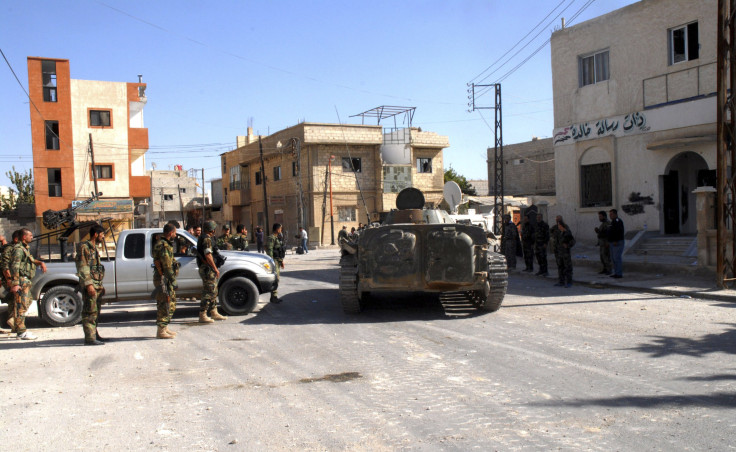Damascus Diary: Playing Backgammon As Soldiers, Assad Supporters Loot In The Capital

DAMASCUS, Syria -- I didn’t want to interrupt the backgammon, but I needed a taxi, and the two drivers on duty appeared engaged in a heated game.
“Excuse me,” I said. “Anyone available?”
“Oh, sure. Please, this way,” one of the players said as he stood up and led me to his car. “You saved me from a losing game anyway.”
I thought he was just being gracious, but when we got into the car, he explained that the game was something of a sham.
“It’s just a safe way to pass the time,” he said. “Otherwise, we’d be talking about things we really shouldn’t be talking about.”
I assumed he meant the delicate situation in Damascus, like the checkpoints that sometimes add two hours to an otherwise short and easy commute, the misery of ever-so inflated food and fuel prices combined with little work, and the mortar shells that fall on random street corners throughout the city, maiming and killing ordinary people.
I assumed also that he was referring to the fear of saying the wrong thing to the wrong person, like an informant or a closeted regime loyalist.
Since the uprising-turned-civil war began nearly three years ago, the government’s grip has grown brutally tight on the capital, and life here has become ever more oppressive and corrupt. Many Damascenes view the government troops and state security that now swarm Damascus as little more than armed thugs preying on the civilian population, while authorities turn a blind eye.
Many like myself have long abandoned driving our own car for fear of car-jacking on government-controlled roads. In my case, I was spooked after armed government men at several checkpoints appeared too interested in where I lived and in the specs of my car, a used sedan.
The attitude of the armed men -- and on rare occasions women -- at checkpoints becomes more threatening the closer you get to rebellious areas. If there is no concept of innocence until proven guilty in Syria today, then you are definitely guilty when you venture close enough to a besieged rebel-held area, especially at the final government checkpoint.
People queueing up at such checkpoints are presumed to be rebel sympathizers, and they are treated as such. Men of fighting age who hail from rebellious areas avoid these checkpoints because many have disappeared that way. Women and children trying to get home inside a besieged area can endure hours of waiting in line at the checkpoint to be searched and vetted. Sometimes, they are denied entry for no reason at all, or told to return the next day and try their luck then.
And of course, since the purpose of these checkpoints is to implement the government siege, not a single loaf of bread or a bag of baby milk or medicine are allowed into the rebellious area, and the soldiers conduct body searches to ensure this is the case.
The conventional wisdom now is also not to take anything of value on your person when passing through these checkpoints, because everything from a cell phone to a watch and personal jewelry can be “confiscated” without cause. You will never see your belongings again, and there is nothing you can do about it.
You do not have to go outside the city to get a sense of sanctioned theft among government troops.
Today, wherever a government checkpoint stands, nearby grocers have stopped stocking cigarettes and ready-to-eat food like bread, milk, cheese, fresh fruit and candy.
“They just come in and grab what they want, and they might leave some money, hardly enough to cover my wholesale cost. Sometimes they leave no money at all and tell me it’s my national duty to feed them,” complained one grocer who now mainly sells cleaning supplies. “So I no longer stock anything edible.”
Not even homes are immune. In the upper-middle-class neighborhood of Kafar Shouseh, furnished luxury apartments with absentee owners have become fair game to house seizures. There, high-ranking Army officers and state security officials initially moved in a few weeks ago, when they believed a US-led military strike against Syria was imminent. They had abandoned their barracks on the city outskirts fearing they would be targeted, and sought shelter amid civilians in the city center.
But the threat of a military strike has come and gone, yet the government men remain in people’s homes, paying no rent or dues, and insisting it is the home owners’ “national duty” to accept such a thing.
In the car with my hired driver, we talk about none of these things.
Instead, he shares his reasoning for the backgammon ploy.
“Because if we get started talking about the situation, there’s no stopping us,” he said. “And you know, you never can tell who you’re talking to. You can’t trust anyone these days.”
I nod, and wonder why he seems to trust me enough to say such a thing. But I decide not to ask.
He moves on to mundane gossip about his other customers. How this one has left town after vowing never to leave, and that one died of old age in his sleep.
I sit back and listen. We’ll be waiting a while at this checkpoint.
© Copyright IBTimes 2025. All rights reserved.





















